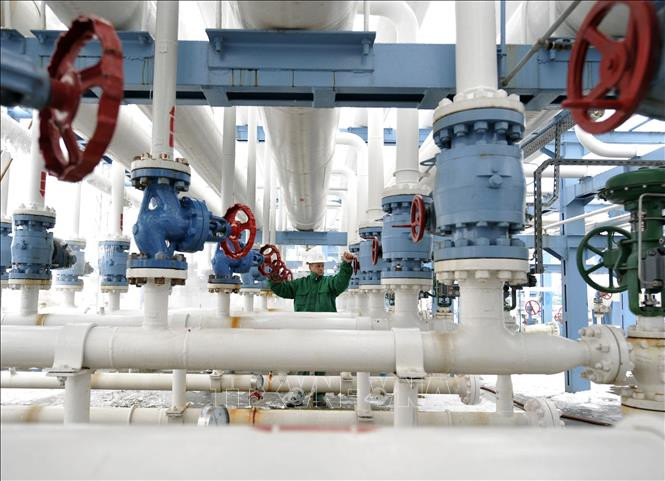With fighting raging between Israel and the Hamas movement in the Middle East, the European Union (EU) is hoping to avoid a repeat of last year's energy crisis.

Last winter, Europeans were hit with record-high energy bills as the continent rapidly weaned itself off Russian gas. This year, the EU is better prepared. But now another war has broken out, one that threatens to shake the bloc’s energy markets.
Two wars threaten energy markets
The conflict between Israel and Hamas threatens to disrupt Europe’s relationship with the Middle East and even push Iran into direct confrontation with Israel and its Western partners. While markets are relatively calm for now, either scenario could cause serious turmoil.
However, Europe is well equipped to deal with the tightening of global oil and diesel markets, EU Energy Commissioner Kadri Simson told Politico recently. EU leaders have learned from the Russia-Ukraine conflict and are working to clarify the vulnerabilities to fix the situation, as well as how to prepare for any incidents or emergencies.
EU officials have held several meetings with oil-producing countries in recent weeks, including old partners like Norway and emerging ones like Algeria and Nigeria, to prepare for any potential disruptions, Ms Simson said.
“After the Gaza crisis, we are faced with two conflicts in Europe’s neighbourhood. The Eastern Mediterranean is a key location for European energy security, as Europe’s energy transition remains entangled in geopolitical uncertainties,” the commissioner said.
The intense conflict in Gaza and to a lesser extent fighting along Israel’s northern border with Lebanon have had only a limited impact on the oil market. Fuel prices initially rose on news of the Hamas attack on Oct. 7 and Israel’s strong response. But benchmark Brent crude has fallen 4.2% this week to around $81 a barrel, around where it was before the violence broke out.
The market has avoided a repeat of 1973, when the Yom Kippur War between Israel and its neighbors prompted major Arab producers, led by Saudi Arabia, to embargo exports to Israel’s allies. Gulf states’ relations with Israel have improved markedly over the past 50 years. The United Arab Emirates (UAE) and Bahrain signed agreements to normalize relations with Tel Aviv under the 2020 Abraham Accords, while Saudi Arabia is negotiating a similar deal.
Traders are therefore betting that as long as the conflict does not widen, oil supplies will remain stable. Viktor Katona, a crude oil analyst at energy intelligence firm Kpler, said the risk is more from Iran. In the worst case, a widening conflict could lead to Iran blocking the Strait of Hormuz, a vital shipping route. Iranian crude is exported in large quantities to China. “If Israel starts attacking Iranian territory and Iran exports less oil as a result, China will not have enough crude and will need to buy from elsewhere,” said Katona. “That is the whole spiral that will be triggered immediately.”
Although Iranian leaders have repeatedly threatened the state of Israel and supported Hamas’ attacks last month, they have denied any involvement in planning such attacks. The Israel Defense Forces (IDF) says it has struck forces in Syria with close links to Iran’s Islamic Revolutionary Guard Corps (IRGC), but has so far not stopped striking targets inside Iran.

Lessons learned
The gas market was more directly affected by the war. Israel shut off the taps to the offshore Tamar gas field within hours of the Hamas surprise attack, fearing that the area could be targeted by rockets. While Israel produces relatively small amounts of natural gas (about 21 billion cubic meters last year) compared to Russia’s 618 billion cubic meters, it is a major exporter to neighboring Egypt. And the period of Tel Aviv’s gas shutdown exacerbated Egypt’s power outages. Flows have since resumed, albeit in smaller quantities.
Any escalation with Iran could impact gas as well as oil markets, given that a third of the world’s liquefied natural gas and a sixth of its oil pass through the Strait of Hormuz. “If things stay the same, there’s no problem, but if there’s a war with Iran and they block the Strait of Hormuz, prices will definitely go up,” said an EU diplomat familiar with domestic energy strategy talks.
However, the official noted that all major countries want to avoid escalation and Iran itself wants to avoid this because of the threat of sanctions.
If that catastrophic scenario does not come to pass, the impact on the EU gas market will be limited, and driven more by the conflict in Ukraine than the conflict in the Middle East, said Tom Marzec-Manser, head of gas analysis at commodity intelligence firm ICIS.
According to the European Commission, member states have cut their combined use of natural gas by nearly 20%, while industrial output has fallen and renewables have played a much larger role in generating electricity. However, consumption actually rose in October for the first time since the war in Ukraine, an early sign that businesses may be trying to restore production.
But even though the bloc’s gas reserves are more than 99% full ahead of schedule, prices on the continent remain high compared to other regions, meaning Europeans are at high risk of seeing sharp spikes in energy costs in the short term.
“We are in a much better position than in 2022. We have more heat pumps, power plants are back up and running, and we have built more liquefied natural gas stations,” said Georg Zachmann, senior fellow at Bruegel, an energy think tank. But he warned that if member states lose focus on reducing demand and try to favour their own industries with subsidies, it could lead to a wasteful race to the bottom that is ultimately detrimental to everyone.
Meanwhile, winter in Europe has been anything but. Record-breaking temperatures have been recorded globally over the past four months, while last winter was the second warmest on record in Europe, according to the EU’s Copernicus satellite monitoring report released this week.
According to Tin Tuc newspaper